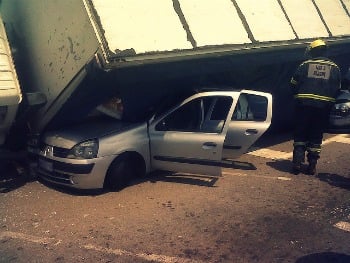 DON JERRELL
DON JERRELL
HNI Associate Vice President
Companies train their drivers, employees, and managers on safety, all with the goal of preventing a trucking accident. But the fact is, claims do and will occur. And when they do, you better be ready.
Personal injury claims against motor carriers have skyrocketed, both in the number filed and in the size of the jury verdicts awarded. You don’t have to look far to find examples — companies such as Schneider, J.B. Hunt, and Covenant have been slammed with judgments as high as $40 million.
So who needs to be trained to respond following a trucking accident? The short answer is, every person in your company has a role. Read on to discover how the best companies prepare their staff from the top down.
The Driver
The driver is first at the scene of the accident. What a driver does (or doesn't do) can have a major impact on the ultimate outcome of a claim. A driver never should admit fault, and when possible, he should take photos and get witness information.
Above all, drivers must maintain a calm demeanor and remain professional. Witness and police testimony of the situation will be colored by perception of the character of the driver. Fair or unfair, it's human nature to make those sort of judgments.
Safety Department
Drivers have a responsibility to notify the safety department ASAP. The safety department will walk them through what to do, including determining whether the driver is subject to drug or alcohol testing. It must be clear to both drivers and safety staff who is designated to take a trucking accident call. This person must be trained on emergency situations and low-risk practices.
This safety rep also must have deep understanding of the tools and resources available for accident management (and prevention). Safety and drivers should work together to develop "cheat sheets" and flow charts that walk through accident response best practices, and these documents must be present in every cab — and readily available in the safety department, too.
Leadership
What are you going to do when your phone rings when it’s the media? “No comment” is one of the worst things you can say. It comes off as an admission of guilt. Have a statement prepared that you can give the media. It can be generic and neutral. In fact, you can word it such that you hardly have to amend it based on the circumstances. Basically you just need to say that you're cooperating with investigators to understand what happened and that you'll share news as you get it.
Employees
In addition to the external response, give some thought to how you would need to respond internally. What will you tell your people the next day? Employees will want to know what’s going on and if the future of the company is at risk.
You should clearly specify who is allowed to speak to the media before a major incident. You do not want employees jumping in to comment if they are approached (and they will be). One thing to note: The person you want to put in front of the camera might not necessarily be your most-senior leader, but figure that out in advance.
Be Prepared for the Big One
It’s not fun to think about what you would do in the event of a major accident. Every trucking company dreads that 3 a.m. call saying that your driver was in an accident resulting in a fatality.
But we all know that prevention is the best medicine. Making sure your team is prepared to respond can prevent a serious claim to turning into a multi-million dollar verdict against your organization.
Need help bringing your drivers up to speed on accidents? Download our sample training slide deck (below) to drive home the vital points.
Related Posts:
5 Things Drivers Never Should Do at the Scene of an Accident
SLIDE DECK: How to Predict, Prevent & Protect from Volatile Claim Scenarios in Transportation
Understanding Roadside Violations: The Key to Motor Carriers' Legal Defense
Medical Cards for Drivers: What Carriers Really Think
.png?width=69&height=53&name=Acrisure%20Logo%20(White%20Horizontal).png)

 DON
DON 
